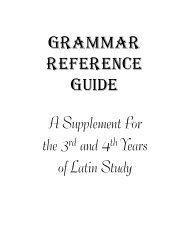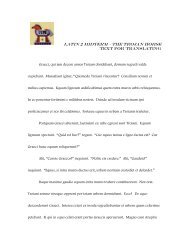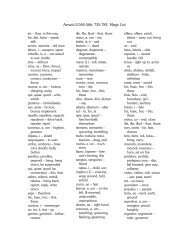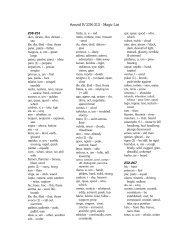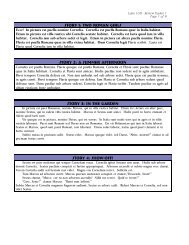Create successful ePaper yourself
Turn your PDF publications into a flip-book with our unique Google optimized e-Paper software.
280: Simile: Mnes<strong>the</strong>us' ship like a dove360: Simile: Sergestus' ship like a snake run-over378-477: Footrace429: Nisus slips in sacrificial blood478-641: Boxing488: Dares512: Acestes urges on En<strong>the</strong>llus613: Aeneas stops <strong>the</strong> match: " Poor man, what madness has possessed your mind?"625: Entellus' prize & <strong>of</strong>fering642-715: Archery682: Acestes' flaming arrow716-794: The Troy Parade795-922: Juno, Iris; <strong>the</strong> Trojan Women burn <strong>the</strong> ships879: Ascanius903: Aeneas' dismay950: Anchises' image appears: "obey <strong>the</strong> excellent advice old Nautes gives"961: Anchises' prophecy1023: The Trojans set sail1026: Venus & Neptune1077: "One life shall be enough instead <strong>of</strong> many"1103: Palinurus and <strong>the</strong> god Sleep1150: Aeneas' ironic closing words: "O Palinurus, too trustful <strong>of</strong> <strong>the</strong> tranquil sky & sea, youwill lie naked on an unknown shore."<strong>Aeneid</strong> 6: Italy & <strong>the</strong> Underworld• Vergil's Book 6 has its counterpart in Homer's Odyssey trip to <strong>the</strong> Underworld, here heencounters a young comrade-in-arms recently dead, tries in vain to embrace his mo<strong>the</strong>r'sshade, and sees a procession <strong>of</strong> mythological personages as well as his Greekcompanions killed at Troy during <strong>the</strong>ir homecomings.• The description <strong>of</strong> Vergil's Underworld, not always consistent in its parts and itsconception, includes two passages extremely important for <strong>the</strong> <strong>Aeneid</strong> as a whole:Anchises' explanation <strong>of</strong> reincarnation and <strong>the</strong> soul's progress, and <strong>the</strong> long pageant <strong>of</strong>Roman history still to come.• This book shares with <strong>Aeneid</strong> 2 great descriptive power, but is full <strong>of</strong> mystery. Note both<strong>the</strong> entrance (The Golden Bough) and exit (Twin Gates <strong>of</strong> Sleep) to <strong>the</strong> Underworldare magical and enigmatic.• Although it contains final glimpses <strong>of</strong> Aeneas' Trojan past and his last attempt tocommunicate with Dido, Book 6, in preparation for <strong>the</strong> coming wars that lead up to<strong>the</strong> founding <strong>of</strong> Rome, emphasizes <strong>the</strong> future. This is <strong>the</strong> first part <strong>of</strong> <strong>the</strong> poem to takeplace on <strong>the</strong> Italian mainland, and Vergil invests it with a completely Roman feeling, inits identification <strong>of</strong> well-known places named after characters (Misenus, Palinurus), aswell as its invocation <strong>of</strong> both distant and recent Roman history.1: Landing at Cumae in Italy (Hesperia)19: Temples <strong>of</strong> Apollo: scenes created by Daedalus



